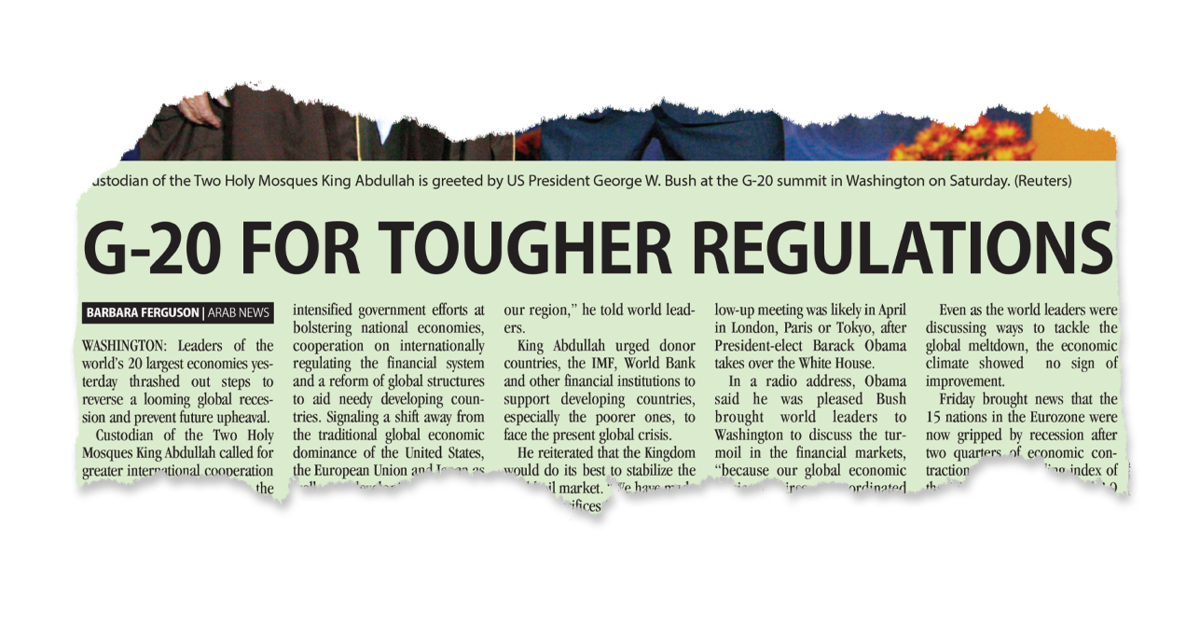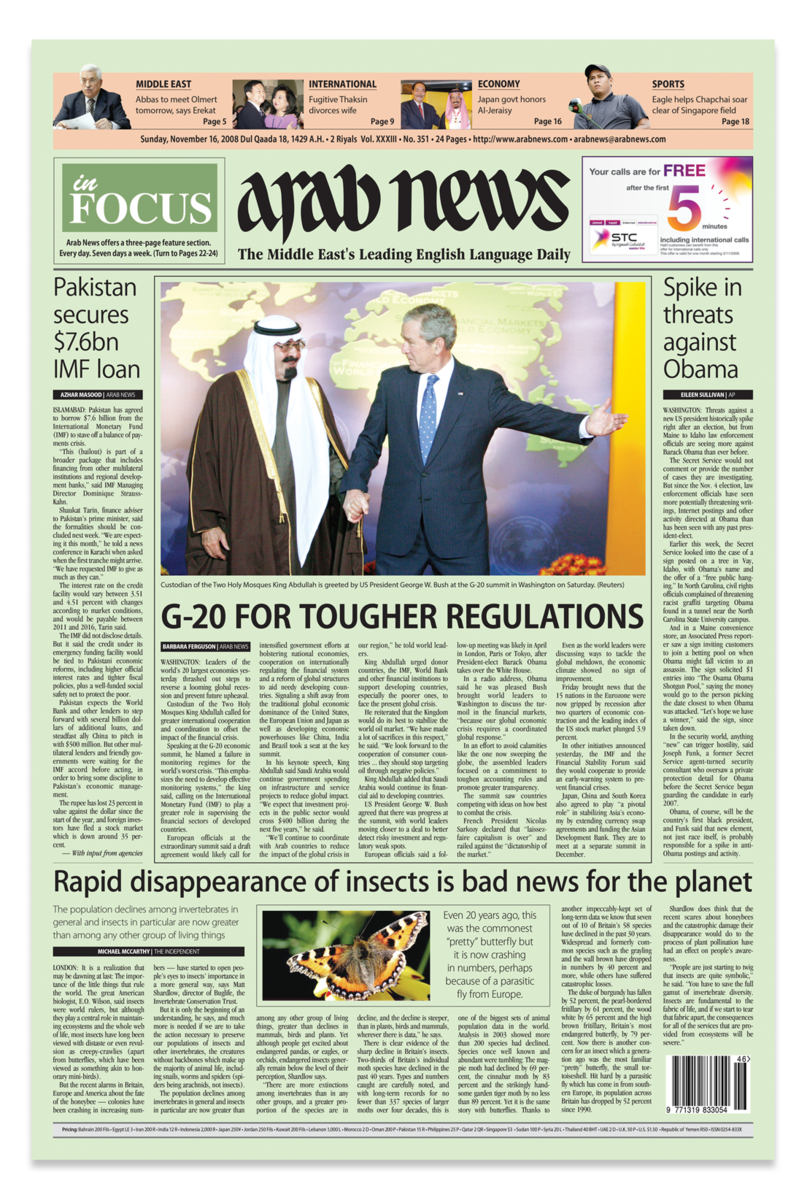The Kingdom took on a leadership role in tackling the global financial crisis of 2008
Summary
On Nov. 14, 2008, G20 leaders from the world’s top 20 economies met for the first time in Washington, DC, led by US President George W. Bush, to discuss solutions to the stock market crash. The gathering, elevated from a finance-minister level, was in answer to a call for greater international cooperation in stabilizing economies.
Saudi Arabia, the largest oil exporter in the group and a rising new economy, proved itself as a key member of the Group of Twenty. King Abdullah, who headed the Saudi delegation, addressed the global challenges with the other leaders, just as the current King Salman is now is rallying the G20 leaders to address the global pandemic.
JEDDAH: On Nov. 14, 2008, Saudi King Abdullah bin Abdul Aziz joined the first meeting of the leaders of the Group of 20 hosted by US President George W. Bush in Washington, DC, showcasing the Kingdom’s respected position as one of the top 20 economies in the world.
The G20 was formed in 1999 during a forum in Cologne, Germany that was attended by finance ministers of the original Group of Seven (Canada, France, Germany, Italy, Japan, the UK and the US) and bank governors. In response to a financial imbalance as a result of the 1997 Asian financial crisis, the attendees discussed the initiation of a summit that included more of the global community, comprising 10 industrial countries and 10 emerging market economies.
The group’s founding was primarily the initiative of German finance minister Hans Eichel, and finance ministers convened every year to discuss international economic policy issues and promote international financial stability.
On the initiative of US President George W. Bush’s administration, the G20 finance ministers meeting was elevated to the level of leaders, and the first G20 summit was held in November of 2008. The call for more immediate action by heads of state was due to the collapse of global stock markets that year. The first high-level G20 group assembled in Washington, DC, giving Saudi Arabia a chance to demonstrate its global leadership and showcase its economic importance.

“Custodian of the Two Holy Mosques King Abdullah called for greater international cooperation and coordination to offset the impact of the financial crisis.”
From a story by Barbara Ferguson on Arab News’ front page, Nov. 16, 2008
During my first semester as a masters of public health student in Europe in 2008, I kept up with all news related to Saudi Arabia and followed the G20 summit with great interest as it was up to the leader of our nation to show the global community its commitment to its partners and the world.
As a young Saudi, I lived through some of the early reforms by King Abdullah after he became ruler in 2005. I was a witness to the economy’s boom, a result of the reforms to development infrastructure in the Kingdom. Later, as an Arab News reporter in 2019, I traveled to Tokyo and reported from the T20 (Think 20) Tokyo Summit, one of the G20’s engagement groups.
To understand the G20, you have to understand the T20. It is the intellectual backbone connecting bridges between policy recommendations, called Task Forces (TF), of successive G20 presidencies. Annual summit topics include trade, climate change, terrorism and gender equality.
Key Dates
-
1The Group of Twenty is founded after the Asian financial crisis as a forum for finance ministers and central bank governors of 19 countries and the EU.
-
2Headed by US President George W. Bush, leaders of the G20 members met in Washington, DC amid the global stock market collapse. Saudi Arabia’s delegation was headed by King Abdullah bin Abdul Aziz.

-
3The G20 Hamburg summit’s final communique announces that the 2020 G20 summit is to be held in Saudi Arabia for the first time.

-
4The first meeting of the Saudi Arabia-China High-Level Joint Committee between then Deputy Crown Prince Mohammed bin Salman and President Xi Jinping attending the G20 Hangzhou summit.

-
5Saudi Arabia assumes the G20 2020 presidency from Japan.
-
6King Salman calls on G20 leaders to partake in an extraordinary virtual summit in the midst of the coronavirus pandemic to put forward a coordinated set of policies to protect people and safeguard the global economy.

-
7The 15th meeting of the G20 is still scheduled to be held in Riyadh.
I met with heads of Saudi think tanks and researchers at the meeting and spoke about their proposals, many of which would be adopted in the next presidency chaired by Saudi Arabia in 2020. The proposed TFs are selected carefully, as the head of the Saudi T20 delegation, Dr. Fahad Al-Turki, was kind enough to describe it as “a collective effort to ensure continuity” and not break the cycle that first began in 2012, when the T20 engagement group was launched.
For two days I read papers and spoke to heads of research centers from my home country, Japan, Argentina, the US and Japan, sitting through sessions that were open to the public, and read the final communique. I now know more. The G20 is not just simply a gathering of leaders: It is a village of ministers, heads of agencies, researchers, economists, mayors (yes, mayors) and scientists that have set up important policies in order to have more control over their economies while assisting challenged and poorer economies.
Going back to 2008, for two days behind closed doors in Washington, world leaders discussed financial market woes and discussed ways to bounce back, before finally gathering for the first ever “family portrait.”
The G20 is not just simply a gathering of leaders: It’s a village of ministers, heads of agencies, researchers, economists, mayors (yes, mayors) and scientists.
Rawan Radwan
In Arab News’ Nov. 16 edition, it was reported that King Abdullah called for greater international cooperation and coordination to offset the impact of the financial crisis. He emphasized “the need to develop effective monitoring systems” and called on the International Monetary Fund (IMF) to play a greater role in supervising the financial sectors of developed countries.
His speech came at a time when the Kingdom was going through various reforms to modernize the country’s business environment, which resulted in the country climbing from 35th to 27th place in rising global economies, moving up to 10th place among the top 40 a few years later.
King Abdullah pledged to provide assistance to developing countries “with the amount it provides exceeding the percentage established by the UN for assistance from industrial countries,” a role the Kingdom has played for years, even before it joined the G20.

A page from the Arab News archive showing the news on Nov. 16, 2008.
The significance of Saudi Arabia’s participation at the first G20 leaders’ summit is that it not only showed that it plays a role in the global market, but also demonstrated the Kingdom’s responsibility to become a voice for the region and the developing world.
Despite its relatively short history, the G20 lay the foundation for stable and rational relations in continuation of the efforts of the G7.
To ensure regional balance over time, the G20 presidency rotates annually according to a system that reflects its nature as an informal political forum.
A little over a decade later, Saudi Arabia assumed the G20 2020 presidency on Dec. 1, 2019. The 2020 G20 Riyadh summit will be the 15th meeting for the G20 member states at a time when the world is facing yet another crisis, the COVID-19 pandemic, which is set to decimate economies even more than the 2008 global financial crisis.
With the difficulties the world is currently facing with the pandemic, King Salman conducted an extraordinary virtual summit on March 26 with the G20 leaders to advance a coordinated response. It was part of a continued effort by the Kingdom’s leadership to play its role in stabilizing the economies of the world, as there is no returning to normal after COVID-19, but with a united front there is a path forward.
- Rawan Radwan, Arab News’ regional correspondent based in Jeddah, reported from the T20 (Think 20) Tokyo Summit, one of the G20’s engagement groups.

























